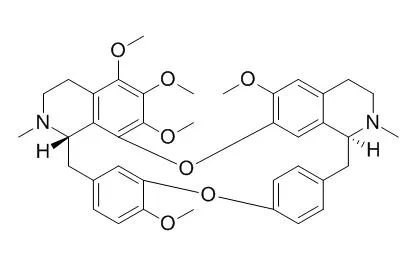| In vitro: |
| J Nat Prod. 2016 Aug 26;79(8):2135-42. | | Hernandezine, a Bisbenzylisoquinoline Alkaloid with Selective Inhibitory Activity against Multidrug-Resistance-Linked ATP-Binding Cassette Drug Transporter ABCB1.[Pubmed: 27504669 ] | Considering the wide range of diversity and relatively nontoxic nature of natural products, developing a potential modulator of ABCB1 from natural sources is particularly valuable.
METHODS AND RESULTS:
Through screening of a large collection of purified bioactive natural products, Hernandezine was identified as a potent and selective reversing agent for ABCB1-mediated MDR in cancer cells. Experimental data demonstrated that the bisbenzylisoquinoline alkaloid Hernandezine is selective for ABCB1, effectively inhibits the transport function of ABCB1, and enhances drug-induced apoptosis in cancer cells. More importantly, Hernandezine significantly resensitizes ABCB1-overexpressing cancer cells to multiple chemotherapeutic drugs at nontoxic, nanomolar concentrations.
CONCLUSIONS:
Collectively, these findings reveal that Hernandezine has great potential to be further developed into a novel reversal agent for combination therapy in MDR cancer patients. | | Oncotarget. 2016 Feb 16;7(7):8090-104. | | Hernandezine, a novel AMPK activator induces autophagic cell death in drug-resistant cancers.[Pubmed: 26811496] | Drug resistance hinder most cancer chemotherapies and leads to disease recurrence and poor survival of patients. Resistance of cancer cells towards apoptosis is the major cause of these symptomatic behaviours.
METHODS AND RESULTS:
Here, we showed that isoquinoline alkaloids, including liensinine, isoliensinine, dauricine, cepharanthine and Hernandezine, putatively induce cytotoxicity against a repertoire of cancer cell lines (HeLa, A549, MCF-7, PC3, HepG2, Hep3B and H1299). Proven by the use of apoptosis-resistant cellular models and autophagic assays, such isoquinoline alkaloid-induced cytotoxic effect involves energy- and autophagy-related gene 7 (Atg7)-dependent autophagy that resulted from direct activation of AMP activated protein kinase (AMPK). Hernandezine possess the highest efficacy in provoking such cell death when compared with other examined compounds. We confirmed that isoquinoline alkaloid is structurally varied from the existing direct AMPK activators.
CONCLUSIONS:
In conclusion, isoquinoline alkaloid is a new class of compound that induce autophagic cell death in drug-resistant fibroblasts or cancers by exhibiting its direct activation on AMPK. |
|






 Cell. 2018 Jan 11;172(1-2):249-261.e12. doi: 10.1016/j.cell.2017.12.019.IF=36.216(2019)
Cell. 2018 Jan 11;172(1-2):249-261.e12. doi: 10.1016/j.cell.2017.12.019.IF=36.216(2019) Cell Metab. 2020 Mar 3;31(3):534-548.e5. doi: 10.1016/j.cmet.2020.01.002.IF=22.415(2019)
Cell Metab. 2020 Mar 3;31(3):534-548.e5. doi: 10.1016/j.cmet.2020.01.002.IF=22.415(2019) Mol Cell. 2017 Nov 16;68(4):673-685.e6. doi: 10.1016/j.molcel.2017.10.022.IF=14.548(2019)
Mol Cell. 2017 Nov 16;68(4):673-685.e6. doi: 10.1016/j.molcel.2017.10.022.IF=14.548(2019)